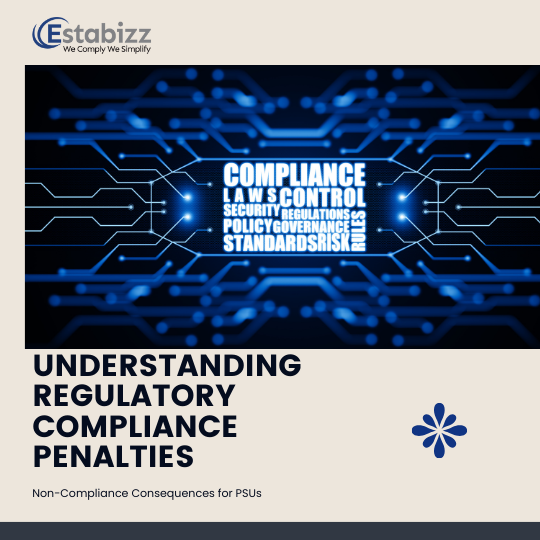Understanding the Penalties on Indian Oil Corporations (PSUs) for Regulatory Non-Compliance
Estabizz Fintech Pvt Ltd brings to light the recent penalties imposed on Indian Oil Corporation Ltd. (IOC) and Bharat Petroleum Corporation Limited (BPCL) by the National Stock Exchange (NSE) and Bombay Stock Exchange (BSE). For the fifth consecutive quarter, these leading oil refiners and marketers have faced fines due to not adhering to the stipulated norms concerning board composition, particularly regarding independent directors.

Breaking Down the Non-Compliance Issue

Regulatory Requirements and Fines:
The cornerstone of this issue lies in the failure to comply with the regulatory mandate that requires a balanced ratio of independent directors to executive directors, including the presence of at least one female director on the board. Specifically, the fines were levied for not meeting the standards set by Regulation 17(1) of the SEBI (LODR) that pertains to the composition of the Board of Directors as of June 2024.
- Indian Oil Corporation Ltd. found itself penalized with a fine of ₹5,36,900 by both NSE and BSE for this oversight.
- Bharat Petroleum Corporation Limited also faced a fine amounting to ₹2,41,900 from each stock exchange for similar reasons.
Responses from the Corporations:
Indian Oil and Bharat Petroleum, among others, argued that the responsibility for the appointment of independent directors falls under the government’s purview, rendering them incapable of rectifying the issue independently. Both companies have appealed for waivers, underlining their inability to control these appointments as a primary defense. Continuous dialogue with the Ministry of Petroleum and Natural Gas aims to resolve these gaps and reinstate compliance with corporate governance standards.
Broader Impact and Continuous Efforts
It is noteworthy that Indian Oil and Bharat Petroleum are not alone in this predicament. Other major players like Hindustan Petroleum, GAIL, Oil India, and Mangalore Refinery and Petrochemicals have also been fined amounts up to ₹5,36,900 each for similar non-compliance for consecutive quarters, highlighting a sector-wide challenge in meeting governance requirements.
Estabizz Fintech’s Perspective on Corporate Governance
From Estabizz Fintech Pvt Ltd’s viewpoint, the recurrence of such penalties underscores a significant gap in the governance mechanisms of public sector enterprises. The narrative doesn’t just reflect on the individual entities but also throws light on the systemic issues concerning government involvement in the corporate governance of public sector undertakings (PSUs). It stresses the need for a more streamlined and autonomous process in the appointment of board members to ensure compliance and enhance corporate governance standards.
The fines, totaling ₹5,36,900 each for several quarters including the January-March period of 2024, and similar fines in the preceding quarters of the financial year 2023-24, signify not only a financial repercussion but also a reputational risk, emphasizing the urgent need for systemic reforms.
As it stands, the discussion encapsulates the primary concerns and facets of the penalties imposed on Indian Oil Corporation Ltd. (IOC) and Bharat Petroleum Corporation Limited (BPCL) due to non-compliance with corporate governance norms. Highlighting the issues, responses, impacts, and providing a perspective on the way forward, the narrative comprehensively addresses the key elements surrounding the fines levied for the fifth successive quarter.
Moving Forward: Recommendations and Strategies
While the preceding sections elucidate the current scenario and its implications, Estabizz Fintech Pvt Ltd also envisions strategies and recommendations to mitigate such governance lapses in the future:
1. Enhanced Government Coordination: A more cohesive approach between the government bodies and PSUs could streamline the appointment process of independent directors. Establishing a dedicated panel or committee to expedite and prioritize these appointments could address the lag efficiently.
2. Fostering Corporate Independence: Encouraging PSUs to have a say in the selection of independent directors might foster a more balanced board composition. This would not only expedite compliance but also ensure that the directors align more closely with the company’s vision and operational ethos.
3. Transparent Reporting and Communication: Regular and transparent communication between the PSUs, regulatory bodies, and stakeholders about the steps being taken to resolve the compliance issues could mitigate reputational damage and investor concern.
4. Adequate Training and Induction: For new appointees, especially female directors, conducting comprehensive induction and training sessions would ensure they can contribute effectively from the onset, thereby maximizing the board’s effectiveness.
5. Proactive Monitoring and Compliance Measures: Setting up an internal compliance task force within PSUs to monitor and ensure adherence to all regulatory requirements can prevent future lapses. Regular audits and reviews can be instrumental in this regard.
Estabizz Fintech’s Role in Future Governance
As a fintech player, Estabizz Fintech Pvt Ltd can play a pivotal role in improving the governance landscape of PSUs. By leveraging technology, Estabizz can offer innovative solutions for compliance monitoring, governance auditing, and stakeholder communication. Implementing fintech solutions could provide real-time insights, predictive compliance analytics, and streamlined reporting mechanisms, facilitating better governance practices and regulatory adherence.
Conclusion: Embracing Change for Corporate Excellence
In wrapping up, the fines levied on Indian Oil and Bharat Petroleum for consecutive quarters serve as a critical reminder of the need for robust corporate governance structures within India’s public sector enterprises. While navigating through the challenges, it is imperative for all stakeholders to collaboratively work towards embedding governance practices that are not only compliant but drive the strategic vision and sustainable growth of these enterprises. Estabizz Fintech Pvt Ltd remains committed to being a part of this transformative journey, aiding through technology-driven solutions and advocacy for best practices in corporate governance.
Conclusively, while the penalties highlight a compliance oversight, they also open an avenue for broader regulatory and governance reforms within the public sector oil enterprises in India. For enterprises like Indian Oil and Bharat Petroleum, aligning with corporate governance norms is not just a regulatory requirement but a step towards enhancing transparency, accountability, and investor confidence in the long run. Estabizz Fintech Pvt Ltd advocates for a proactive stance in addressing these challenges, ensuring compliance, and upholding high governance standards to sustain investor trust and market integrity.
Estabizz Fintech compiled the material in this article using the most recent Acts, Rules, Circulars, Notifications, Provisions, Press Releases, and material applicable at the time. They ensured the completeness and correctness of the material through due diligence. When using this material, users must consult the relevant, applicable legislation. The given data may change without prior notice and does not constitute professional advice. Estabizz Fintech disclaims all liability for any results from the use of this material.






